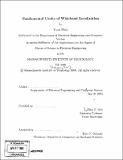Fundamental limits of wideband localization
Author(s)
Shen, Yuan, Ph. D. Massachusetts Institute of Technology
DownloadFull printable version (7.284Mb)
Other Contributors
Massachusetts Institute of Technology. Dept. of Electrical Engineering and Computer Science.
Advisor
Moe Z. Win.
Terms of use
Metadata
Show full item recordAbstract
Location-awareness is essential for many wireless network applications. However, determining nodes' positions precisely is a challenging task, especially in harsh multipath propagation environments. To address this problem, wide bandwidth signals are envisioned to be used in future localization systems, since such signals can provide accurate range measurements. In this paper, we investigate the localization performance of wideband networks and proposed a performance measure called the squared position error bound (SPEB) to characterize the localization accuracy. We derive the SPEB succinctly by applying the notion of equivalent Fisher information (EFI). The EFI provides insights into the essence of localization problem by unifying the localization information from individual anchors and that from a priori knowledge of the agent's position in a canonical form. We also investigate the use of wideband antenna arrays and the effect of clock asynchronism on the localization accuracy. Our analysis begins with the received waveforms themselves rather than utilizing only signal metrics, such as time-of-arrival and received signal strength, extracted from the waveforms. Our framework exploits all the information inherent in the received waveforms, and therefore the SPEB serves as a fundamental limit of localization accuracy.
Description
Thesis (S.M.)--Massachusetts Institute of Technology, Dept. of Electrical Engineering and Computer Science, 2008. Includes bibliographical references (p. 107-112).
Date issued
2008Department
Massachusetts Institute of Technology. Department of Electrical Engineering and Computer SciencePublisher
Massachusetts Institute of Technology
Keywords
Electrical Engineering and Computer Science.